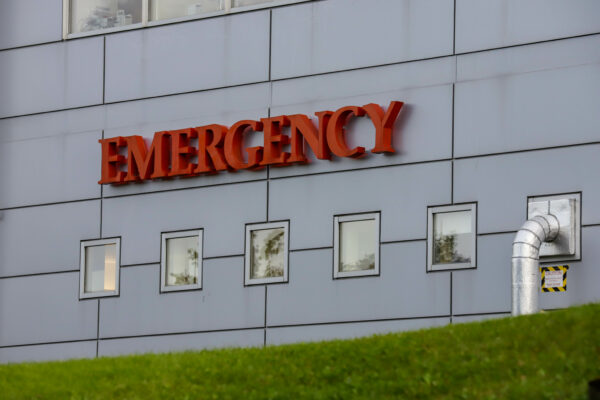
Alaska’s hospitals are beginning to see the effects of another increase in coronavirus cases due to the omicron variant but – so far – not in the same way as the delta variant, which filled the state’s Intensive Care Unit beds with patients last fall.
Instead, there was an apparent uptick Thursday in health care workers calling in sick due to testing positive or having direct exposure to someone infected, said Jared Kosin, president of the Alaska State Hospital and Nursing Home Association.
Kosin says it’s unclear whether omicron will cause as many hospitalizations as delta did. He says forcing a lot of health care workers off the front lines is another big problem.
Listen here:
The following transcript has been lightly edited for clarity.
[Sign up for Alaska Public Media’s daily newsletter to get our top stories delivered to your inbox.]
Jared Kosin: We know omicron spreads a lot faster. And we also know we’re on the tail end of the holiday season where a lot of people are traveling. So we expect this to hit. We don’t know exactly when or what it was going to look like. But it’s starting to take the form of really hitting health care workers and staff. And that can create a big problem for our ability to respond. And it can create a big problem quickly.
RELATED: Here’s some tips for how to get tested for COVID-19 in Anchorage
Casey Grove: There’s still a lot to learn about what’s going to happen here with omicron. But, at this point, do you feel like the state is well prepared to deal with it?
JK: I think we’re all exhausted. Everybody — health care, non-health care. It is wild to think I mean going back to September, October of last year — which was basically yesterday — we had crisis levels we’ve never experienced before in the health care system here. So now we’re staying relatively stabilized. And we’re about to roll into what will be another surge, presumably, we just don’t know what form it’s going to take — is it going to be a surge from the respect that it’s going to hit our staff and compromise our ability to provide medical care? Or is it going to be that big wave of overwhelming admissions? Or, in a worst-case scenario, is it both? And preparing for that, it’s pretty challenging. But we’re battle-tested. We’ve been through a surge, and it was recent. So we know how to respond in that respect. The state has been proactively working on those relief workers they brought up, and looking to extend those relief workers into March. They would have left in December and the state extended them into January. And now there’ll be a gradual phase-down to help us get through what will be the next surge. So from a staffing standpoint, that helps a lot. But if it is kind of that hit-you-from-both-sides scenario, it’s going to get overwhelming pretty quick. And we’re going to need everybody’s support. But I think it’s kind of a wait-and-see. That’s the other part with this latest variant is it seems like it’s the scenario where it’s going to be a straight shot upwards, in terms of the surge. It’s going to happen fast, it’s already happening. And we’re hoping for a straight line down once we hit our peak. So hopefully, this thing will flame out quickly. And if that is true, then I think the timeline that the state has come up with should be really helpful.
RELATED: Omicron wave hit Alaska this week, state health leaders say
CG: Have you made changes in your personal life because of things that you’re hearing about micron? I mean it’s kind of hard sometimes to maintain this vigilance. And we’ve had good news, and maybe, you know, felt more comfortable in the past. And now we’re talking about another variant. Have you changed how you’re doing things here recently?
JK: From a personal standpoint? Yes. As of today, I was supposed to be down at an economic conference on the Kenai Peninsula today. And I decided to go virtually at the last minute. And, you know, for all of us, we have different circumstances at home. I have a young family, not everyone’s able to get vaccinated. And when you’re dealing with something like this that can really do harm to people who are not vaccinated, it makes our personal choices carry that much more weight. So unfortunately, yeah.
CG: It’s that switching back-and-forth thing that I think it makes it kind of extra tough.
JK: Yeah. I think some people think about this, like, ‘Oh, great, you know, I’m gonna get it. And so why do I care anymore? And what’s the point of all this? We’re gonna have to live with it. We can’t stop society.’ And I agree. We can’t stop society. That’s not what we’re saying. But the risk on this one is, it’s not that we’re all gonna get it. I do think there’s a sense of inevitability at some point. But it’s what that does to the functions within society. In talking about hospitals and nursing homes, if all of our staff get this. You know, we’re still taking precautions where we don’t want to expose other people, which means you quarantine, you’re pulling people off the line. If everyone gets pulled off the line at the same time or close to the same time, our ability to provide medical care is completely compromised. And I’m talking about going to the hospital for routine stuff. If you have to go for not-such-routine stuff. It’s so important to preserve our ability to function and I’m speaking just from health care, this same thing is going to apply to everybody — businesses across the state. When you have a lot of employees out at once, what do you do? And I think, unlike delta where we felt like the real threat was the number of cases that were going to come through the door, now it feels different. And it’s like: How are you going to maintain functionality if a lot of people get sick? So I think that’s the thing right now. It’s like, yeah, we understand we’re not saying that we should shut life down or anything like that. But we do have to recognize the consequences before us. And it is going to be compromising on operations both in the health care sector and out. And that’s something that I think we all don’t want to see.
CG: I think I might just lock myself in this radio studio.
JK: Right? Yeah. I don’t know. Hopefully this is a quick one. Hopefully we get through it intact. And there’s nothing wrong with keeping your fingers crossed and hoping, but we are planning for the worst and taking those steps and we’ll see where this thing goes.
:
Casey Grove is host of Alaska News Nightly, a general assignment reporter and an editor at Alaska Public Media. Reach him atcgrove@alaskapublic.org. Read more about Caseyhere.





